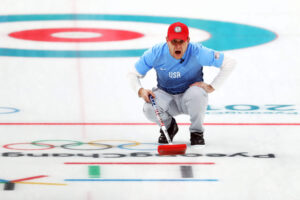Tag: winter olympics
Providence College Investigates
by npatano on February 7, 2022
PCI
Which is the Better Olympics?
Will Murphy ’23
Sports Staff
Summer
The Summer and Winter Olympic Games allow the best athletes in the world to showcase their talents while representing their country. Although both are extremely fun to watch, the summer games beat out the winter games in terms of excitement.
The wide array of sports to choose from during the Summer Olympic Games, ranging from archery to water polo ensures that there will be something for everyone. The track and field events that take place during the Summer Olympics are can’t-miss T.V. The races combine mesmerizing star power with incredible pace. Battles between Jamaica’s Usain Bolt and the rest of the field have been consistently breathtaking for nearly the past two decades, often with Bolt coming out on top. The relays also add another layer to watch during the track and field events, often resulting in chaotic finishes.
The swim events are another aspect of what makes the Summer Olympic Games so fun to watch. The United States’ Michael Phelps’ run of dominance in swimming can be compared to Bolt’s in sprinting, as he is the all-time leader in medals in the Summer Olympic Games, at a whopping 28 medals.
Beach volleyball is another event that adds to the excitement of the games. The beach volleyball matches are fast-paced and never fail to amaze the crowd. Another fan favorite is table tennis, as it is incredible to watch the coordination displayed throughout the matches.
Some of the recently added events have also been rapidly growing in popularity. Skateboarding and surfing were both added as events to the games, and each continue to reach a broader audience. Each sport has polarizing athletes who continue to grow the fanbase for the Olympics.
The Summer Olympic Games also have widely popular sports such as basketball and soccer. Both have consistently provided competitive matchups, with three-versus-three basketball being a recent addition to the games on top of five-versus-five. The great variety of events that provide something for everyone combined with the star power of the Summer Olympic Games pushes them ahead of the Winter Olympic Games.
Overall, both the Summer and Winter Olympic Games are great opportunities for every country around the world to band together and appreciate the hard work that each athlete puts in to reach the levels of greatness required to participate in the Olympics.
Joseph Quirk ’23
Sports Staff
Winter
When it comes to the Olympic games, it always seems to feel like the summer games get much more love and attention than their winter counterparts. In all fairness, the summer games are exciting and have been full of iconic moments, athletes, and events. Usain Bolt and the Jamaican 4×100 meter relay team beating the U.S. team after both squads beat the previous world record time in the same race, for example, are some exciting moments in Olympic history. Similarly, Michael Phelps is one of the most decorated Olympians of all time. And, the cultural significance of the USA Dream Team in the basketball tournament has had an impact to this day. Whatever it may be, winter sports are just as good, and perhaps even better.
The winter games can answer the summer games in terms of star power and iconic moments themselves. Look at Lindsey Vonn, one of the greatest female skiers of all time, or, Shaun White, who makes even the most difficult snowboarding tricks look easy. And, few moments in sports are more iconic than the 1980 Olympic Men’s Ice Hockey Tournament when the United States beat the USSR in the semi-finals and went on to win gold. Needless to say, the winter games are right up there with summer in terms of iconic moments, athletes, and overall enjoyability. However, not notoriety.
Maybe it is because the summer games have more recognizable and exciting sports. After all, it is much easier to get excited about a race when the racers are competing head-to-head and not against a clock like some winter events, but the winter games are vastly underrated in this area too.
For fans of technique and grace, perhaps gymnastics in the summer games is a favorite event. But, figure skating is just as beautiful and graceful and arguably more difficult than gymnastics. And if it resembles “dancing” too much for your taste, half pipe and freestyle skiing and snowboarding are just as technical and dramatic. For fans of speed, speed skating or ski jumping may be interesting. And, of course, the exhilarating downhill skiing events. Anyone who has ever skied or snowboarded knows the rush of flying down a mountain and it is no different here. The hockey tournament, which could be less popular in the United States, is nonetheless incredibly entertaining and intense as the talent is spread evenly worldwide.
The winter games have many great aspects and advantages over its summer counterpart, and it is time we gave these games the respect they deserve.
Plenty of Standouts at Olympics
by The Cowl Editor on March 1, 2018
Professional Sports
Despite Low Medal Total, Plenty of Highlights for the US.
by Joe Myko ’19
Sports Staff

The XXIII Winter Olympic Games was recently held in PyeongChang, South Korea, with the opening ceremony taking place on Feb. 9 followed by 16 jam-packed days full of various winter sports. The closing ceremonies wrapped the games up on Feb. 25.
There were 102 events offered for spectators, ranging over seven sports and 15 different disciplines–including: bobsleigh, snowboarding, figure skating, ice hockey, and various variations of skiing.
Norway impressively concluded the games with the most medals (39), with Germany (31) and Canada (29) finishing 2nd and 3rd in the medal rankings. The United States (23), Netherlands (20), and Sweden (14) had the next highest.
The United States medal breakdown saw them take home Nine gold, Eight silver, and Six bronze medals. Shaun White’s gold medal for the Men’s Snowboard Halfpipe was one of the more memorable moments of the tournament for the US. Not only was he able to secure his third Olympic gold medal, his victory was also the 100th gold medal for the U.S. in the Winter Olympic history.
The Women’s Ice Hockey Team also deserves congratulations for taking home the gold in a memorable 3-2 win against Canada. The win marks the U.S. women’s hockey team first gold medal in 20 years. The women came second in the last two Olympics behind Canada.
The United States’ Men’s Curling Team, comprised of skip John Shuster and a team of Matt Hamilton, Tyler George and John Landsteiner, put on an impressive performance in PyeongChang – securing five back-to-back wins after a shaky start, before finally toppling highest-ranked team Sweden to bring home the country’s second medal in curling and first in gold within the sport.
Despite performing in precarious conditions which pushed back the schedule of two events, Mikaela Shiffrin secured a gold medal for the United States in the women’s alpine skiing giant slalom. Shiffrin took home the second Olympic gold medal of her career, tying Ted Ligety and Andrea Mead Lawrence for most gold medals in U.S. alpine skiing history.
The Olympic Athletes from Russia (OAR) provided an impressive final to the Men’s Ice Hockey event, coming back from 3-2 down to Germany to achieve a 4-3 win in overtime after having tied 3-3 with a short-handed goal with less than a minute left on the clock. This provided Russian athletes with their first gold medal in the event since 1992, when they still competed as the Unified Team.
The Canadian duo of Scott Moir and Tessa Virtue performed a breathtaking ice dancing routine to the soundtrack of Moulin Rouge, providing a memorable event which secured them their third Olympic gold medal and fifth medal overall.

The Nigerian Women’s Bobsled Team provided one of the most memorable and highly-anticipated stories of the tournament, becoming Africa’s first ever Olympic bobsledders. The women were also Nigeria’s second participants at the games in South Korea following Skeleton driver Simidele Adeagbo’s debut for her country. Adeagboo gave an admirable performance within the competition considering she is only six months into competing in the sport on a worldwide scale.
Despite finishing last (115th) in the 15-Kilometer Cross-Country Skiing event, Mexican athlete German Madrazo provided one of the most iconic and memorable moments of the tournament; proudly picking up and waving his country’s flag from the side as he approached the homestretch.
Almost 3,000 athletes took part in the Olympics, competing for a total of 92 nations in all. Six nations also made their Winter Olympic Games debut: Ecuador, Eritrea, Kosovo, Malaysia, Nigeria, and Singapore.
The 2018 Winter Olympic Games logo represented two hangul letters, from the Korean alphabet, which make up the initial sounds of PyeongChang. The first of these symbols is also said to be the Korean philosophical triad of humanity, earth and heaven, whilst the second symbol is a crystal of ice. The games had two official mascots, an Asian black bear called Bandabi and a white tiger called Soohorang.
The next installment of the Winter Olympics is set to take place in Beijing, China, in 2022, with the opening ceremony scheduled for Feb. 4.
End Games in Overtime, Not Shootouts
by The Cowl Editor on March 1, 2018
Professional Sports
No Need to End Big Games in a Shootout
by Meaghan Cahill ’20
Sports Co-editor
On the anniversary of the 1980 Olympics’ “Miracle on Ice,” the United States Women’s Hockey Team made history of their own by winning their first Gold Medal in 20 years. The team achieved victory in a dramatic shootout on Feb. 22, beating rival Canada 3-2. And while the women’s team played phenomenally in all of their games in PyeongChang, their win brings up the much debated argument on shootouts.
There is no denying that shootouts, especially in hockey, can be extremely entertaining to watch. However, despite the entertainment factor, shootouts should not be a determining factor on which team gets to win the game, especially in a game as big as a gold medal game.
During regular season games shootouts are not much of a problem because not much is at stake. Yet, for a gold medal game to be decided by what is essentially a coin flip, that is just not okay. In the National Hockey League, all playoff games are played out until there is a game-winning goal scored, no matter how many over-time periods it takes. That should not be any different for the Olympics.
That is not to take away from the Americans’ win, because it was a remarkable feat all around that was very exciting to watch. However, choosing to end the game with a shootout because it was getting to be too long was not fair to either team. They should have been allowed the opportunity to play until t

he very end because up until that point, those athletes had given everything to come that far in the games, and to let it end like that was not fair to them.
Three sports currently use shootouts as a final determination for who wins the game: soccer, ice hockey, and field hockey. The biggest problem with shootouts is that they do not fairly represent the 60+ minutes played by both teams. There is no denying that teams are giving everything they have in games that go over the standard 60 minutes of hockey and still be tied. Team effort and perseverance drives the entire game and for that game to be decided in a shootout diminishes those aspects of it.
Shootouts come down to a single player and a goalie and there can only be two outcomes: either the puck goes into the net or it is saved. There is really no play involved and it is nothing more than a trivial way to end a game, especially in games of high importance. It denies players the opportunity to contribute to their team win, because ultimately, it is a single player that gets to be the hero of the game.
In conclusion, shootouts should not be used to determine an outcome of a game that so heavily involves team effort. Shootouts ultimately rest on the luck of a single player and in the case of high stakes games such as the Olympics, it does not provide a satisfying ending worthy enough of the two teams fighting for the win.
The Gold Standard Panel
by The Cowl Editor on February 15, 2018
Professional Sports
Former Gold Medal Olympians Talk at PC
by Meaghan Cahill ’20
Sports Co-editor
It has been 20 years since a women’s hockey team from the United States has won a gold medal. And this past weekend, on Saturday, February 10, three members of 1998 Women’s Olympic Hockey Team were present at Providence College to speak on a panel called The Gold Standard.
“I wish I could be there,” Cammi Granato ’93 said as she kicked off the panel in a prerecorded video that played after a video montage of highlights featuring the gold-medal round game. The montage brought player Lisa Brown-Miller ’88 to to “tears” and “gave [her] goosebumps.”On it being 20 years since winning, Granato, captain of the only gold-medal winning, commented, “I can’t believe it.”
So, why did PC put together this panel during Alumni, Family, and Accepted Students weekend? The answer to this question is that the first ever Women’s Olympic Hockey Team consisted of seven PC alum, and three were able to speak on behalf of their team and the remarkable feat they accomplished: Vicki Movsessian ‘94, Sara DeCosta ‘00, and Brown-Miller. “Thank you to the College for inviting us back to be remembered,” Brown-Miller started once Granato’s video had finished.
Hosted by current Providence College Women’s Hockey Coach Bob Deraney, the panel consisted of the three women reflecting on both of their Olympic experiences, PC experiences-all of which they said was “the best,” and how they formed their lives today.

“Every aspect of PC shaped me for the Olympic games…even Western Civ!” DeCosta said with a laugh when asked how PC helped her in her Olympic success.Movsessian was quick to bring up how seven members of the 20 member team came from PC. “A championship environment…that PC built. [The] identity of what women’s hockey became was transformed at PC.” Movessian’s point really kicked off what became the main topic of discussion of the panel: women’s hockey then and now. “We really were the pioneers [of women’s hockey],” Granato stated in her video. “And that is a bond we’ll have forever.”
As mentioned, the 1998 women’s hockey team, a team that Movessian said was made up of “20 people who wanted so badly to do well for each other and collectively win,” was one of the first ever female hockey teams to compete in the Olympics. They also remain the only U.S. women’s team to ever win a gold medal in the Olympic Games.
Prior to 1998, outside of New England, women’s hockey was still almost unheard of. “Growing up…I didn’t know any other girls who played,” Brown-Miller, a Michigan native, stated. “There were not a lot of opportunities back home. PC opened the doors and just as the doors were opening, I was able to step through.”Even DeCosta recognized how small the women’s hockey world was just 20 years ago. “I wasn’t aware of what women’s hockey…was at the time,” she said.
However, Movessian, a Massachusetts native, had a different experience with hockey growing up, stating, “There were tons of opportunities in Mass to play girls and boys hockey.” But even with all of her opportunities to play, Movessian still commented, “We didn’t know about the Olympic games [and the efforts to put a female team together]. We weren’t playing for that reason; we were playing because we loved to play.”
Twenty years after the victory that started a hockey phenomenon, DeCosta stated, “[It has been] an amazing experience to see the growth of women’s hockey…amazing to see the skills and the talent.”
The talent that they spoke of, can be seen in the current PC Women’s Hockey Team, which is currently ranked second in Hockey East, as well as the current 2018 Women’s Olympic Hockey Team. As for this year’s Olympic team, Granato is convinced that the women “are riped to win.” Of course, it has been 20 years since the U.S. has won a gold medal, but Granato stated, “I have a strong feeling this year’s team [will win],” and her sentiments were echoed by all three of her teammates.
Why the Winter Olympics are the Best
by The Cowl Editor on February 1, 2018
PCI
By Ethan Ticehurst ’18
Sports Staff

The Winter Olympics are the best kind of games simply because of the sports that are offered. The most significant example is hockey, a sport in which some sort of competitive balance still exists. As compared to basketball or gymnastics in the summer, both of which have been dominated by Americans in recent years, hockey is the most well-known and most competitive sport in the Olympics. Teams from all across the Northern Hemisphere have a chance to win at hockey, including powerhouses Canada, Russia, Sweden, Switzerland, and the United States.
In addition to a better competitive balance, the Winter Olympics are also more viewer-friendly because they last for about a month just like the Summer Games, but they have much fewer events, which means that events can be scheduled at times that are best for the most viewers. Being a dedicated fan of the Summer Olympics requires watching almost 20 hours of footage a day, due to the non-stop nature of the schedule. The Winter Olympics have a much more relaxed pace, giving viewers the ability to spend less time watching the television.
Finally, the Winter Olympics are also better because they are usually held in lesser-known cities around the world. The Summer Olympics are held in large, congested, and well-known cities in very industrialized nations. The Winter Olympics are more often held in smaller cities, which are given the opportunity to grow and rise to the occasion.
For those of us who enjoy seeing smaller cities around the world, and for the avid hockey fans, the Winter Olympics are the best games to watch.
